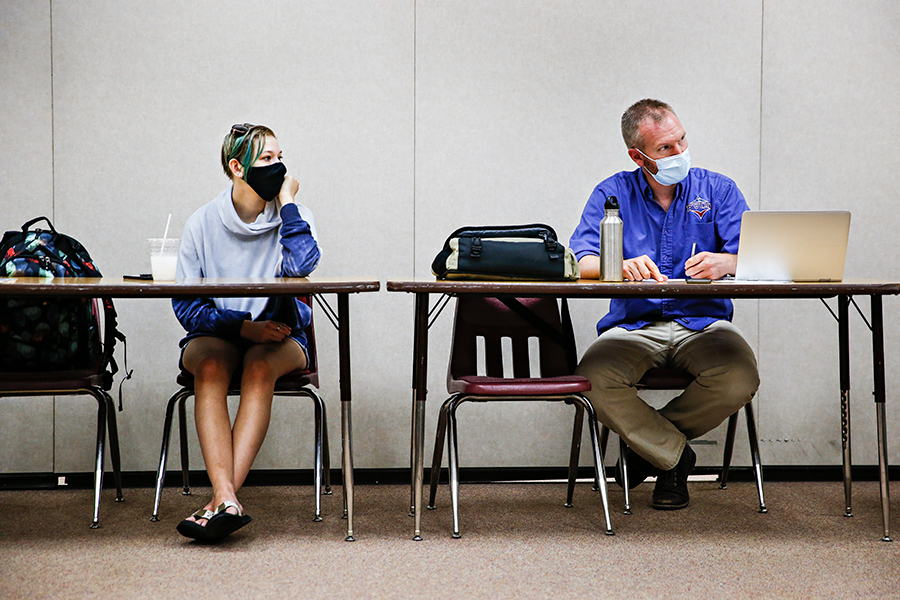Grant Funds FVCC Program for First-Generation, Low-Income and Students with Disabilities
TRIO support service program annually helps 350 students navigate college landscape while fostering social interactions
By Myers Reece
A recently announced five-year $1.92 million federal grant renewal will fund a program at Flathead Valley Community College that provides comprehensive academic support to selected first-generation, low-income and students with disabilities.
The TRIO Student Support Services program at FVCC provides a wide range of services to roughly 350 degree-seeking students annually, including tutoring, mentoring, personal and academic career counseling, financial literacy and more.
FVCC Vice President of Academic and Student Affairs Chris Clouse said she’s “proud of the outstanding TRIO program that our student support team has created.”
“It directly impacts the lives of so many deserving students,” Clouse added. “TRIO provides students with information, training and coaching to navigate the college landscape and chart a path to personal and academic success.”
The five-year funding period for the U.S. Department of Education grant started on Sept. 1. Leslie Greene, the new director of FVCC’s TRIO program, said the nationwide competition to secure the grant is competitive, and FVCC’s ability to once again be selected is “quite an accomplishment” in itself.
“To win the grant shows our dedication to students,” Greene said. “The fact that we’ve done extremely well with the program has helped us to obtain it.”
Greene noted that navigating the college landscape and process is tricky for anybody, let alone first-generation students whose parents don’t have college experience.
“If you’re a first-generation college student, you typically don’t have role models who have traveled that path, too,” Greene said. “You hear a lot of terminology that is brand new to you. We help students interpret and gain that college knowledge.”
Students from low-income backgrounds without financial resources, as well as those with disabilities, face their own unique challenges as well. Some may fit two or all three of the criteria: students who are first-generation, low-income and have disabilities.
The TRIO program provides intensive academic advising and tutoring, as well as classes that teach college success skills free of charge. The program also helps the students to find and apply for scholarships and student aid in a timely fashion, clarify and reach their goals, and more.
“A lot of times students don’t know the services that are available to them,” Greene said.

“Once they’re in the program,” she continued, “we serve them throughout their time at FVCC to make sure they have all the support they need. We help them navigate the process from start to graduation to help them get their college degree.”
Will Richards, FVCC’s assistant director of occupational trades and a TRIO adviser, oversees the TRIO mentoring program, which trains and pays student mentors to guide TRIO participants. Mentors touch base with TRIO students regularly and invite them to weekly in-person socially distanced meetings.
“The mentors are all about connections, whether connecting with services or other people,” Richards said.
On a commuter campus like FVCC, it’s easy for students to go straight to classes and then return home without interacting with many people. Remote classes and an emphasis on physical distance only add to the sense of communal detachment.
“I work in the occupational trades building, and there are a lot of students who never leave this building and venture to other places,” Richards said.
The weekly gatherings, which mentors organize with individual squads of 10-12 TRIO participants, foster social interaction and meaningful connections, which are always important but even more so in this age of pandemic isolation.
Dr. Julianne Holt-Lunstad, a globally recognized authority on the relationship between isolation and health, was a virtual guest speaker during FVCC’s TRIO mentor leadership training this summer. Holt-Lunstad’s expertise meshed neatly with the mentors’ overall mission of community-building and nurturing interactions that can potentially detect, as Richards describes it, “small things before they become big things.”
Examples include students who realize a course isn’t a good fit but are unaware they can drop it with a full refund within the first week; students whose academic struggles could be remedied before they go down the course of failing the class; or students experiencing feelings of isolation and anxiety that could build up to dangerous levels without someone noticing and intervening.
“We know there’s a correlation between social isolation and mental health, and physical health — that’s been well documented,” Richards said, pointing to the benefits of the mentor-guided TRIO gatherings. “A lot of time it’s just the social interaction of doing something fun and laughing once a week that’s important.”
Greene has worked with TRIO for 25 years and “can attest to the fact that it really does work.” She’s seen countless success stories.
“A lot of students start out with a class hoping maybe they surprise themselves and find out that, yes, they do have what it takes to get a college education and that there are support services,” she said. “It’s quite amazing to witness. They achieve a degree and accomplish their college goals that for a lot of students may have seemed out of reach.”